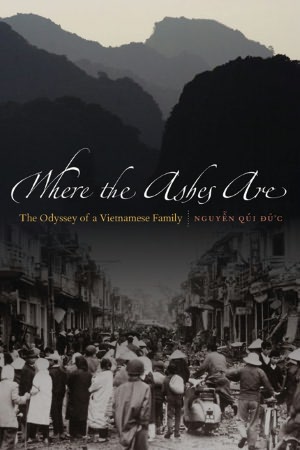diaCRITICS will periodically have guest blogs. Here’s one from Stephen Sohn, professor of English at Stanford University, where he is completing a manuscript on Asian American cultural production. He often reviews Asian American literature at his blog.
Here’s Stephen Sohn’s review for Nguyễn Quí Đức’s 1994 memoir, Where the Ashes Are: The Odyssey of a Vietnamese Family.
Do you enjoy reading diaCRITICS? Then please consider subscribing!

I’ll start this review with an immediate caveat: there are particular linguistic notations, accents, and symbols that I won’t always be including in place names and ethnic names; I’ve already botched the name of the author, which should be written like so: Nguyễn Quí Đức. In any case, that being said, Nguyễn Quí Đức’s Where the Ashes Are: The Odyssey of a Vietnamese Family expands the memoir’s focus in that it is both autobiographical and biographical; it spends time developing the strands of his mother’s, his father’s, and his life as they eventually diverge.
Nguyen, less one of his siblings, an older sister who suffers from mental illness, leaves Viet Nam as a refugee in 1975, while his parents stay behind for different reasons. His father, in particular, as a high ranking South Vietnamese governmental official, subsists in prison for many years. Nguyen’s re-writing of his father’s experiences are interesting in that it obviously would have taken an immense amount of interviewing and temporal reconstruction. Nguyen also relies upon poems that his father had written during his time in prison to help nuance the incredible challenges of his life as a prisoner; his constant movement, the endless monotonous days, and the persistent interrogation remind me much of Xiaoda Xiao’s work on life in prisons during and after China’s Cultural Revolution. His mother tries to remake her life in the post-war regime and maintains a steadfast hope that she will be reunited with her husband.
What is particularly fascinating is Nguyen’s construction of his diasporic subjectivity. Though his parents eventually do reunite and their family again rebuilds in the United States, Nguyen looks to Viet Nam as his home. Despite immense difficulty, he still manages to gain early entry into the country, hoping to reconnect with his roots. The epilogue reveals his critical and nostalgic stance toward conceptions of home, which I think is one of the emotional centers of this book: “In those moments when I shut out San Francisco and think of home, memories of war and a difficult past fade away. The pain is then replaced by the remembrance of family and friends, of rediscovered time and space, of a simpler way of life. . . . I know my notions of my homeland are romanticized. But I am also aware of the difficulties I would face if I were to return to life and live in Viet Nam” (262). The title poignantly refers to Nguyen’s journey to Viet Nam in order to recover the ashes of his older sister, who dies from a kidney infection, one developed while his mother was first visiting her husband after being apart for so many years. She had been suffering from an undiagnosed kidney issue for many years. In some sense, he travels to get the ashes that will symbolically reunite his entire family in the United States.
This memoir adds to the growing body of Vietnamese American memoirs (that include, for instance, Jade Huynh’s South Wind Changing, Le Ly Hayslip’s When Heaven and Earth Changed Places, Andrew X. Pham’s Catfish and Mandala) that detail the complicated American acculturation that follows the refugee movement.
[amazon_enhanced asin=”0803226985″ /][amazon_enhanced asin=”1883513022″ /][amazon_enhanced asin=”1555973051″ /]
[amazon_enhanced asin=”0312267177″ /][amazon_enhanced asin=”0307381218″ /][amazon_enhanced asin=”0452271681″ /]
[amazon_link id=”0803226985″ target=”_blank” container=”” container_class=”” ][/amazon_link]
–
Stephen Hong Sohn, a former University of California President’s Postdoctoral fellow (2006-2007), is currently completing work on a manuscript on contemporary Asian American cultural production. He has co-edited Transnational Asian American Literature: Sites and Transits (Temple University Press, 2006) as well as a special journal issue of Studies in the Literary Imagination (SLI, Vol. 37.1, Spring 2004) on Asian American Literature. He has recently completed editing a special journal issue for MELUS, entitled “Alien/Asian: Imagining The Racialized Future” (Winter 2008). He was co-chair of The Circle for Asian American Literary Studies (CAALS), a literature society affiliated with the American Literature Association from 2006-2008. Recent publications include the afterword to Myung Mi Kim’s Dura (reprinted by Nightboat Books). He co-edited a special issue of Modern Fiction Studies on the topic of “Theorizing Asian American Fiction” in 2010.
–
Please take the time to rate this post (above) and share it (below). Ratings for top posts are listed on the sidebar. Sharing (on email, Facebook, etc.) helps spread the word about diaCRITICS. And join the conversation and leave a comment! Have you read Nguyễn Quí Đức’s work? What did you think?
Do you enjoy reading diaCRITICS? Then please consider subscribing!



Thanks for this review. I was wondering how this book might be different from Andrew Pham’s “The Eaves of Heaven”? Much of the books I’ve read on Vietnamese acculturation into the US are from the 1.5 generation. I don’t know if you are aware of the group of 50-65 year old Vietnamese expatriates who spend their lives on assignment as top execs in multi-national companies in Asia and return frequently to Vietnam, often retirin there. In many ways, I find their stories of life after 1975 , in particular their accomodation with the current government, more compelling than those who stayed and settled in the west. Their rootless “international” children who have only their Vietnamese roots to anchor them in their globalized lives, are also interesting story subjects.
Duc’s book was published about fifteen years earlier. and Duc isn’t a 1.5 but a 1st generation refugee, given how he grew up through his teen years in Vietnam.